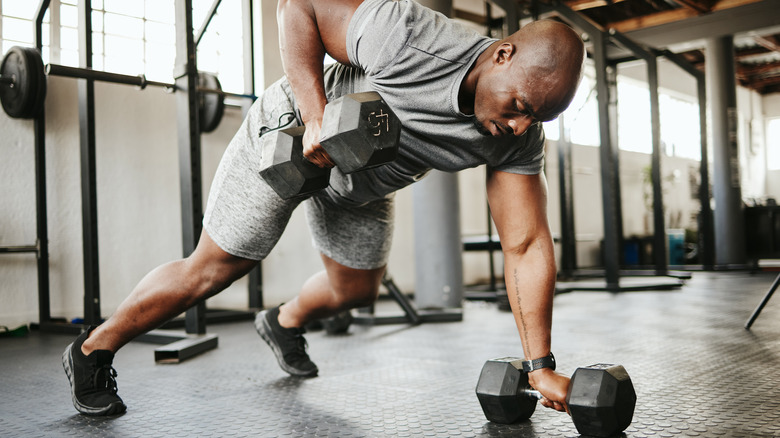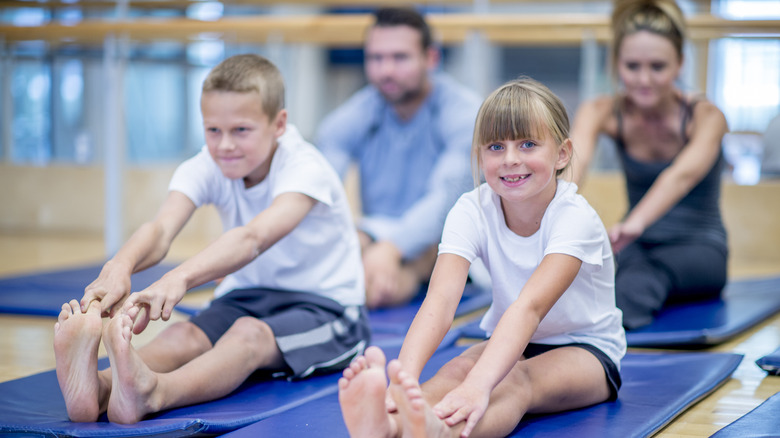How Your Genes Affect Your Success At The Gym
Some people love the gym and exercise. It's like exercise is their life's calling. However, others struggle to make it to the gym every day. It doesn't matter how motivated they are to help improve their life; the gym and exercise aren't their forte. And it's much harder for them to get the desired results.
Like everything else, specific genes can make your time at the gym more successful. Genetics is the study of the genes and traits you possess and carry on to your family, explains the Centers for Disease Control and Prevention (CDC). You might have noticed that athleticism is passed on through families. Well, genetics has a part to play in this. Researchers at the University of Jyväskylä have found that some people possess specific genotypes to support higher athletic activity. So, having this genotype can make them more successful when seeking out athletic activities and hitting the gym regularly.
We'll show you how genetics can affect your success in the gym and how it can make specific exercises better for your body. We'll also look at ways to help you stick to your exercise routines even if your genes are against you.
How genes can influence your exercise success
It's true you can do anything you set your mind to, but some people have more success when it comes to exercise. Research published in 2023 in the European Journal of Epidemiology found individuals are genetically predisposed to complete higher levels of physical activity and exercise. The study examined 35 years of polygenic risk scores from 47,000 Norwegians aged 19 to 100. Niko Tynkkynen, a doctoral researcher at the Faculty of Sport and Health Sciences, explained their findings saying, "Genetic predisposition favoring physical activity was associated with [a] healthier profile in cardiovascular risk factors and lower disease risk, even after accounting for self-reported physical activity levels."
Research published in 2021 in PLoS One also found that some people are genetically positioned to succeed more with specific exercises. The study looked at over 3,000 people completing three types of exercises: strength training, cardiovascular, and anaerobic power. The results showed a 72% variation in response to muscle strength exercises, a 44% difference in cardiovascular exercise, and a 10% difference in anaerobic power exercises. The difference was attributed to 13 different gene variations in the body.
How you can make your genes work for you at the gym
The research shows every exercise isn't made for every body type. Understanding your genes and making them work for you can give you the most bang for your buck. "Because everyone's genetic make-up is different, our bodies respond slightly differently to the same exercises. Therefore, it should be possible to improve the effectiveness of an exercise regime by identifying someone's genotype and then tailoring a specific training program just for them," lead author of the PLoS One study Henry Chung told Oxygen. He further pointed out this could be particularly beneficial to those in professional sports or hospitals who need to build up their muscles quickly.
For example, a study in Arquivos Brasileiros de Cardiologia found the angiotensin I-converting enzyme (ACE) gene is associated with cardiovascular fitness and middle-distance running performance in males. The reasoning might be due to the way this enzyme helps to deliver oxygen to the lungs. It's also a key player in regulating blood pressure, according to a 2003 study in Genome Biology. Variations in this gene allow for more efficient blood pressure regulation and oxygen delivery could benefit those completing specific exercises.
Additionally, the ACTN3 gene variants have been linked to improved performance among athletes, says Medline Plus. This gene is responsible for providing the instructions for proteins found in the muscle fibers. Certain variations may give you more strength, speed, or endurance.
Tips to make your gym routine stick regardless of your genes
Knowing your genes can help you improve your body in the most efficient way possible. However, it's not all about genes when hitting the gym. Determination and motivation can be big factors in your success because any gene variants are sure to find they are too tired to hit the gym. WebMD states having a plan can help motivate you to hit the gym. For instance, take it slow when you're just starting your exercise routine. It's also good to mix up your routine to keep yourself interested. Doing it with someone else also makes it fun together time rather than grueling exercise.
Behavior and habits can get you a long way. For example, a 2021 study published in Nature found that digital programs encouraging exercise could improve the number of people who hit the gym. The study's lead author, Dr. Katherine Milkman, told NBC News, "Make a plan. Set calendar reminders in your phone or computer. Just like we sent people text reminders, link exercise with a temptation and figure out ways to make yourself not miss two in a row... Then, don't stop."
To get the most out of your genes, you need to hit the gym. Make a plan and use your body's cues to get the most out of your workout.




